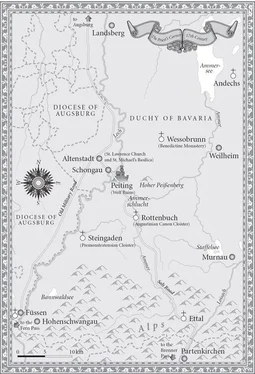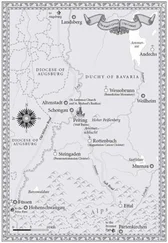Oliver Potzsch - The Dark Monk
Здесь есть возможность читать онлайн «Oliver Potzsch - The Dark Monk» весь текст электронной книги совершенно бесплатно (целиком полную версию без сокращений). В некоторых случаях можно слушать аудио, скачать через торрент в формате fb2 и присутствует краткое содержание. Жанр: Исторический детектив, на английском языке. Описание произведения, (предисловие) а так же отзывы посетителей доступны на портале библиотеки ЛибКат.
- Название:The Dark Monk
- Автор:
- Жанр:
- Год:неизвестен
- ISBN:нет данных
- Рейтинг книги:5 / 5. Голосов: 1
-
Избранное:Добавить в избранное
- Отзывы:
-
Ваша оценка:
- 100
- 1
- 2
- 3
- 4
- 5
The Dark Monk: краткое содержание, описание и аннотация
Предлагаем к чтению аннотацию, описание, краткое содержание или предисловие (зависит от того, что написал сам автор книги «The Dark Monk»). Если вы не нашли необходимую информацию о книге — напишите в комментариях, мы постараемся отыскать её.
The Dark Monk — читать онлайн бесплатно полную книгу (весь текст) целиком
Ниже представлен текст книги, разбитый по страницам. Система сохранения места последней прочитанной страницы, позволяет с удобством читать онлайн бесплатно книгу «The Dark Monk», без необходимости каждый раз заново искать на чём Вы остановились. Поставьте закладку, и сможете в любой момент перейти на страницу, на которой закончили чтение.
Интервал:
Закладка:
The aldermen nodded. As so often, the remarks of their clerk seemed sound and logical, and a general feeling of satisfaction reigned immediately after he spoke. “You’ll see,” Johann Lechner said, packing his goose quill and inkpot in his leather briefcase. “When Scheller is strung up on Gallows Hill, peace will return to the town. You have my word on that.”
9
The following day, a snowstorm swept over the entire Priests’ Corner, as if the good Lord wanted to bury all life under a white cover. People stayed inside their houses and cottages, and when they did peek outside, it was only to briefly mumble a short prayer and shut their doors against the rattling wind. Traffic on the river, as well as on the roads, came to a halt, and the blizzard took a number of wagon drivers by surprise, leaving them to die lonely deaths, struggling to free their horses from snowdrifts several yards deep. They were not found until days later, frozen stiff alongside their wagons, some torn to shreds by the wolves, their horses having run off in the vast expanse of white.
The blizzard hit Augsburg, too. Since the day after Magdalena’s arrival, she had not been able to leave the hangman’s house for even a minute. Of course, time was of no importance, since a leisurely stroll through town was out of the question, in any case. The apothecary was surely closed in such weather, and the next commercial convoy to Schongau would have to wait until the weather cleared. Magdalena knew that traveling on her own would be suicide.
Thus, during the day, she made friends with little Barbara, who quickly captured her heart. Sitting by the fire, Magdalena whittled a wooden doll for her, singing the same children’s songs she had for the twins at home. She could sense the girl needed a mother. Barbara stared at her with her big eyes, running her hands over Magdalena’s cheeks, and pleaded “Again!” whenever Magdalena got tired and stopped singing. Magdalena often thought about the fact that little Barbara was a hangman’s daughter just like herself, except she had no brothers or sisters and, above all, no mother. How often had she herself sat just like this long ago in the lap of her father? How often had her own mother sung her to sleep with the same children’s songs?
During this time, Philipp Hartmann was working in the room next door, tying together bundles of herbs, making new ropes, and distilling herbal brandy in dark flasks. The aroma of alcohol drifted through the room, almost intoxicating Magdalena. From time to time, the hangman dropped in and patted his daughter on the head or gave her and Magdalena a prune or a dried apple. He avoided touching or making any unseemly advances on Magdalena, but she could sense him staring at her back. When he did so, a chill came over her despite the warmth in the room. Philipp Hartmann was certainly a good man and a good father, and well-to-do, but she loved someone else.
But did she really still love Simon? After the whole business with Benedikta, she noticed how her feelings had cooled-whether out of anger or disappointment, she couldn’t say. It would take time for her heart to warm to him again.
The blizzard raged into the next day, not letting up until evening, so the stores remained closed. Not until the third morning after her arrival could she finally get out to the apothecary. Along the way, she passed the enormous Augustus Fountain, now draped in icicles a yard long, and looked up at the five-story city hall on her left. Magdalena shuddered. How could men make such huge buildings? Patricians wrapped in heavy fur coats streamed out of the portal, absorbed in deep conversation. The snow was still knee-high, but city watchmen were already shoveling narrow lanes through the town square and the surrounding streets. Homes and shops were coming to life. People had been confined for two days, and now they could go out shopping again. They bought fresh bread and meat or fetched pitchers of foaming brown beer from the innkeeper. Magdalena made her way through crowds of quarreling cooks, each trying to buy a rabbit or pheasant for his master, and a group of choirboys on their way to the Augsburg Cathedral.
Finally, she arrived. Straight ahead, between Maximilianstra?e and the magnificent St. Moritz Church, was the Marienapotheke, the oldest apothecary in Augsburg. That morning, Philipp Hartmann had told Magdalena that the owner, Nepomuk Biermann, worked closely with him and had the best selection of herbs and other ingredients in town. Hartmann bought several ingredients there that he couldn’t prepare himself, and in return, Nepomuk Biermann ordered from the hangman human fat and leather to treat joint pain and tight muscles.
“Biermann is a strange fellow,” Philip Hartmann said, “but he really knows what he is doing and tries to treat you fairly. Be sure you get to see the herb room-it’s huge.”
Nepomuk Biermann’s place was a narrow four-story gabled building that could have used a new coat of paint. Situated among patrician homes, it looked a little like a neglected stepchild. Magdalena passed under a sign that displayed the name of the shop in flowing letters. Opening a narrow but solid door, she was immediately enveloped in a cloud of fragrances-dried herbs and exotic odors that reminded her of their own medicine chest at home. She closed her eyes and inhaled the strange aromas, many of them from another world of plants and spices far across the ocean, from ancient forests where lions and other monsters dwelled, or from distant islands inhabited by cannibals and mythical creatures with feet attached to their heads. There was an aroma of cinnamon, muscat, and black pepper.
When Magdalena closed the door behind her, a little bell rang. Shortly thereafter, a man appeared. Stooped over, he was small and mostly bald, except for a fringe of hair around the sides like a monk. From behind an eyepiece resting on his nose, he stared out at the hangman’s daughter with a disgruntled expression. Evidently, he’d been occupied with something more important than the menial work of waiting on customers.
“Yes?” he asked, looking her up and down as he would an annoying insect. “How can I help you?”
“I was sent by Philipp Hartmann,” Magdalena said. “I’m supposed to pick up a few herbs.”
At once, the man’s expression changed. His toothless mouth broadened into a smile. “Hartmann, huh? Did the Augsburg hangman manage to get a woman, after all?”
“I’m…just helping him at present,” Magdalena stammered, handing Nepomuk Biermann the list of ingredients. Gripping his eyepiece, the pharmacist studied the piece of parchment. “Aha, I see,” he mumbled. “Ergot and artemisia, also daphne, belladona, and thorn apple. What are you going to do with this-send the hangman off into the other world or ride away yourself on a broomstick?”
Magdalena struggled for words. “I…uh…We’re expecting a difficult birth,” she finally said. “The child won’t come and the mother’s in great pain.”
“Aha, I see, severe pain,” Nepomuk Biermann said, holding the glass up to his eye again. “But be careful you don’t give her too much of it all at the same time, or the good woman won’t suffer any pain at all. Ever again.” He grinned and winked his right eye, which peered out like that of a giant fish from behind the eyepiece. “You know, dosis sola venenum facit- it’s only the dose that makes the poison. Even old Paracelsus knew that. Did the hangman tell you about Paracelsus, eh?”
Magdalena nodded quickly, and the little man left it at that. Nepomuk Biermann walked toward a low doorway that led from the shop counter to the rear of the building. He motioned for her to follow. “Come along, girl, you can at least help me collect the herbs.”
Magdalena hurried after him. She found herself in a room cluttered with shelves and drawers. High wooden walls divided the room into sections and doubled as shelves. Nepomuk Biermann scurried like a dervish through the narrow corridors, carefully opening labeled drawers here and there. He checked the contents of each drawer against the list in his hand, spooning out a portion and weighing it on a scale that stood on a marble table in the center of the room.
Читать дальшеИнтервал:
Закладка:
Похожие книги на «The Dark Monk»
Представляем Вашему вниманию похожие книги на «The Dark Monk» списком для выбора. Мы отобрали схожую по названию и смыслу литературу в надежде предоставить читателям больше вариантов отыскать новые, интересные, ещё непрочитанные произведения.
Обсуждение, отзывы о книге «The Dark Monk» и просто собственные мнения читателей. Оставьте ваши комментарии, напишите, что Вы думаете о произведении, его смысле или главных героях. Укажите что конкретно понравилось, а что нет, и почему Вы так считаете.












